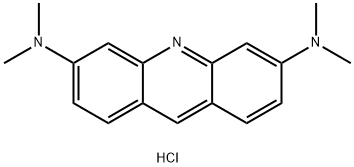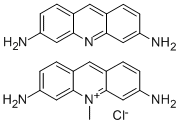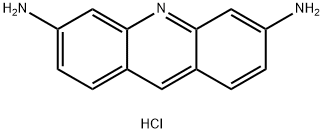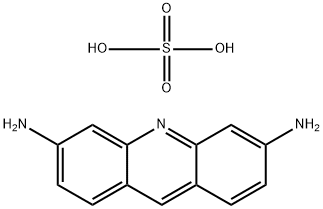M9190434
AcridineOrangehydrochloride? , >99% , 65-61-2
Synonym(s):
3,6-Bis(dimethylamino)acridine hydrochloride;Acridine Orange - CAS 65-61-2 - Calbiochem;AO, 3,6- bis(Dimethylamino)acridine, HCl
CAS NO.:65-61-2
Empirical Formula: C17H20ClN3
Molecular Weight: 301.81
MDL number: MFCD00012660
EINECS: 200-614-0
| Pack Size | Price | Stock | Quantity |
| 100mg | RMB488.00 | In Stock |
|
| 500mg | RMB2156.80 | In Stock |
|
| others | Enquire |
Update time: 2022-07-08
PRODUCT Properties
| Melting point: | 284-287 °C(lit.) |
| Density | 1.001 g/mL at 20 °C |
| refractive index | n20/D 1.338 |
| storage temp. | -20°C |
| solubility | Soluble in water, ethanol, dimethyl sulfoxide |
| form | Powder |
| pka | -3.2, 10.5(at 25℃) |
| Colour Index | 46005 |
| color | orange to red |
| Water Solubility | H2O: 0.1%, clear, orange to red |
| ε(extinction coefficient) | ≥14,000 at 227-233nm in water at 0.005g/L ≥35000 at 265-271nm in water at 0.005g/L |
| λmax | 500 nm |
| BRN | 3734978 |
| Major Application | Adhesives; aluminophosphate crystalline materials; detecting clay particles; display device; evaluating fiber surface characteristics; glass matrixes; imaging material; inks; lasers; recording materials; photoresists; textiles; thin films; tracers for hydrology; wiring boards |
| Biological Applications | Detecting cancer cells,spores,human papilloma virus (HPV),stress biomarkers; treating amyloid associated diseases,lupus,pathogen infections; apoptosis assays; cytotoxicity assays |
| CAS DataBase Reference | 65-61-2 |
| EPA Substance Registry System | C.I. Basic Orange 14 (65-61-2) |
Description and Uses
Acridine orange is a dye that interacts with DNA and RNA by intercelation or electrostatic attraction. This cationic dye has been used as a fluorescent stain for nucleic acids in agarose and polyacrylamide gels.
Safety
| Symbol(GHS) |  GHS08 |
| Signal word | Warning |
| Hazard statements | H341 |
| Precautionary statements | P201-P202-P280-P308+P313-P405-P501 |
| Safety Statements | 22-24/25 |
| WGK Germany | 3 |
| RTECS | AR7601000 |
| HS Code | 32041300 |
| Toxicity | dnd-mus:ast 20 mmol/L BBACAQ 374,96,74 |




